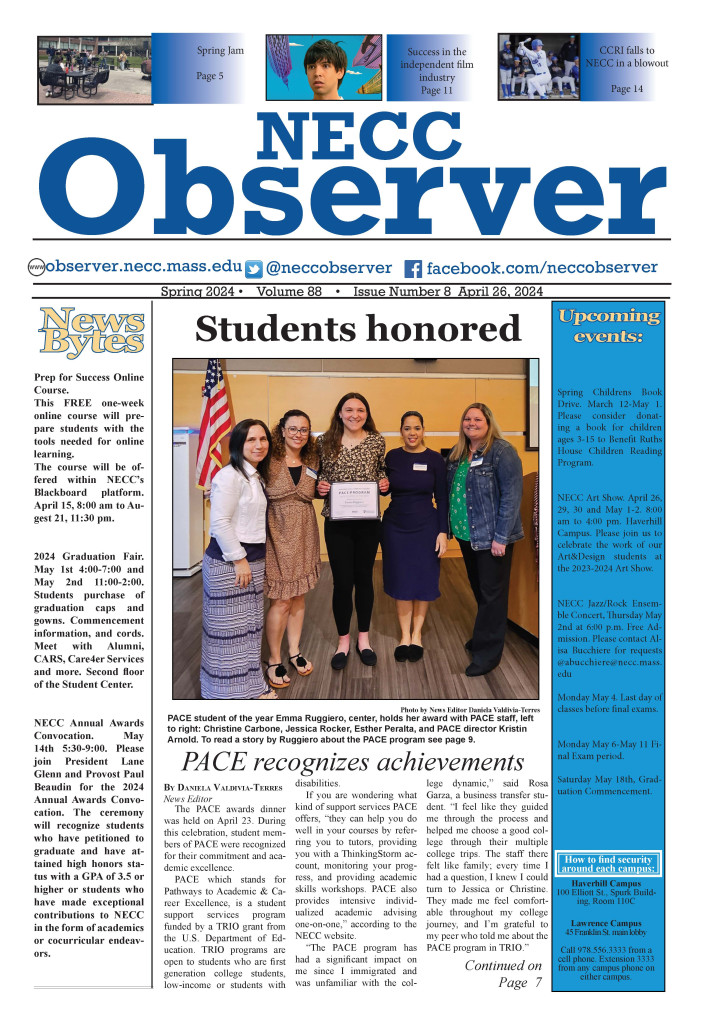Kim Kardashian came under fire earlier this month when she tweeted a nude, yet censored, photo of herself with the caption, “When you’re like, ‘I have nothing to wear,’ LOL.” Women are sounding off, NECC students included.
Singer-actress Bette Midler responded to Kardashian by tweeting a challenge out to her: “Put your selfie to work … for a good cause! Donate, RT, I’ll match (your money) 2-1,” with a link to her charity.
Another celebrity who commented on Kardashian’s post was up-and-coming actress Chloe Moretz. Moretz said that Kardashian should be teaching young girls that they have more to offer than just their bodies.
“I truly hope you realize how important setting goals are for young women,” said Moretz to Kardashian over Twitter.
Jess Palmer, NECC alumna and advocate for body positivity, had a similar reaction.
“I think she’s a horrible influence for young women … She represents that beauty and outer appearances are what matter,” she said. Palmer added that she doesn’t see Kardashian’s representation of herself as authentic, suggesting the photo was probably Photoshopped.
On the other hand, Tarah MacGregor, a Liberal Arts major, said, “As much as I dislike (Kardashian), I was impressed. It took guts to do what she did in a society that objectifies her body daily, but reacts with disgust when she shares her body on her terms.”
This was a sentiment shared by many, and supporters of Kardashian have also taken their turn to speak out against the phenomenon known as “slut shaming.” According to Wikipedia, slut shaming is defined as “a form of social stigma applied to people, especially women and girls, who are perceived to violate traditional expectations for sexual behaviors.”
Actress Bella Thorne tweeted, “I think every woman should be allowed to make their own choices with their own bodies… and it’s not our place to tell them what they can and can’t do with their body.”
Slut shaming, body positivity and the over-sexualization of women’s bodies have been controversial, hot-button issues in the last few years with the rise of movements such as Free the Nipple, which holds the position that society should stop sexualizing women’s nipples and demonizing them for breastfeeding in public; The Selfie Movement, which is a new take on the selfie being a symbol for “self-love,” not “self-centered”; and the #365FeministSelfie project, started by a professor in Chicago, which encourages people to embrace their faces every day no matter what they look like.
“Slut shaming isn’t chill ever,” said actress Abigail Breslin to those speaking out against Kardashian. “Anybody who tries to say how a woman chooses to display their own body is wrong, is severely misinformed and misguided.”
MacGregor said woman-on-woman shaming is the worst kind. “I don’t know a single woman who has not experienced body shaming. The fact that we know the emotional toll this takes on us and use it as a weapon against each other is deplorable.”
As a self-proclaimed “healthy, plus-size woman living in a size-zero world,” MacGregor makes it a point to endorse body positivity. She sees the “body-shaming” celebrities as doing more harm than Kardashian’s initial post.
Melanie Peicott, third-year liberal arts major, elaborated on this point. “We are told to love ourselves and have confidence, but we can’t love ourselves too much because then we’re seen as conceited.”
Palmer turns to social media to give a voice to those who struggle with their own self image. She said, “It’s hard when you find yourself looking at someone and automatically judging them … It’s almost automatic these days.”
After all was said and done, two Kardashian supporters tweeted pictures of white roses and handwritten messages that she had sent them as a sign of gratitude.
One message, sent to Ariel Winter, said among the thanks, “Women supporting other women is so powerful.”
Emily Ratajkowski received a letter that ended with a quote from Emma Goldman, “Merely external emancipation has made of the modern woman an artificial being. Now, woman is confronted with the necessity of emancipating herself from emancipation, if she really desires to be free.”
MacGregor, Palmer and Peicott all agreed that society’s standards of women are harmful. Women are being shamed for hiding their bodies, being proud of their bodies and the size, color, condition and age of their bodies.
“Women have all the power to make the world better if we worked together, loved ourselves, and loved each other more,” said Peicott.

